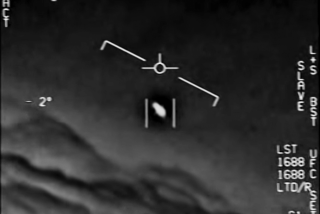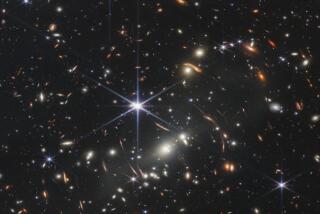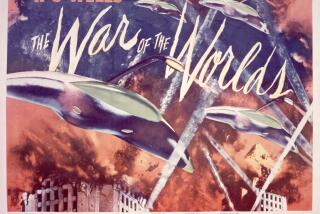The joys of science, plus some rather lame jokes
- Share via
Half a century ago, British novelist, scientist and civil servant C.P. Snow expressed his concern over the separateness of the “two cultures”: the humanities on the one hand and the sciences on the other. Trained in both areas, he was alarmed by the extent to which people proficient in the one often lacked any real knowledge of the other.
Science writers are one group working hard to close that gap, from Matt Ridley explaining the workings of genes to Carl Sagan explaining the workings of the universe. And, heaven knows, the material is innately interesting. The simple (or not so simple) facts of how things work involve truths that are stranger than the most fantastic fiction. Yet this in itself presents a problem: Because many of these phenomena defy our common-sense notions of cause and effect, they are hard to explain in a way that is understandable to the layman.
In “Strange Universe,” Bob Berman, who writes a column bearing that title for Astronomy magazine, invites us to take a closer look at ordinary aspects of our daily lives to discover the true strangeness of the world in which we live.
As he shows, even the smallest details can tell a story. The wail of an emergency vehicle siren demonstrates the Doppler shift, also called the Doppler effect. A plastic curtain pulling inward toward your leg when you turn on the shower illustrates Bernoulli’s principle: “A rapid flow of liquid or gas reduces air pressure in its vicinity. The stream pulls adjacent air along with it, creating a partial vacuum that sucks in the curtain. The same principle makes tornadoes lift roofs and lets airplanes fly.”
Berman touches on a dizzying array of subjects, including UV rays, inert gases, fossils, meteorites, microwaves, rainbows, black holes, space exploration, phases of the moon, solstices, why shadows are blue and hypothetical travel at the speed of light. There’s enough interesting material here to furnish a small encyclopedia.
But how well does he succeed in explaining it? Remember your various high school science teachers? Roughly, they came in three categories: the infinitely frustrating ones whom nobody except the science jocks could understand, the rare and gifted few who had a way of transforming the most abstruse concepts into graspable ideas and the vast majority who fell somewhere in between.
Berman is a reasonably skillful explainer, but he lacks that magical, crystallizing touch that separates the truly great teacher from the merely good.
Like many a good teacher, Berman uses humor to entertain his audience and liven things up. And, when contemplating the scary dynamics of the universe and our own precarious place in it, a little gallows humor is certainly in order: “A student nervously asks his astronomy professor, ‘When did you say life on Earth will be destroyed?’ ‘A billion years from now.’ ‘Oh, thank goodness, I thought you said a million!’ ”
But sometimes, the jocularity that might have worked in the classroom begins to seem a bit forced in chapter after chapter: “If you jump off a table just as a fork falls off, Earth’s gravity pulls on your body with greater force than it pulls on the fork. But since you weigh so much more (especially after dessert), your mass takes longer to speed up, just as a truck accelerates more sluggishly than a sports car. The result is a wash: Your body is yanked more forcefully, but accelerates more reluctantly, and you end up falling at the same rate as the fork. The answer to the most tormenting question -- not why we can’t seem to forgo dessert, but why all this happens -- eludes us.”
The main drawback to this book, however, is its lack of a unifying theme. In one chapter, we are told why large bodies of water don’t freeze. Another focuses on the various powers, some real, others merely mythological, that people have attributed to the moon. Another investigates the phenomenon known as Groundhog Day.
Elsewhere, we’re treated to a facetious disquisition on space aliens: “A real problem could arise if we found them irresistibly scrumptious -- or vice versa. If aliens tasted like lobster, the SETI (Search for Extraterrestrial Intelligence) project ... might become a Search for Extra Tasty Individuals. Humans have long believed in ‘lunch first, science later.’ ”
Berman’s incessant sprightliness can be jarring when more serious subjects are broached, such as the errors that caused such horrible tragedies as the Columbia and Challenger disasters.
Although its individual sections may be interesting enough, considered on the whole, “Strange Universe” is, well, all over the place.
More to Read
Sign up for our Book Club newsletter
Get the latest news, events and more from the Los Angeles Times Book Club, and help us get L.A. reading and talking.
You may occasionally receive promotional content from the Los Angeles Times.







